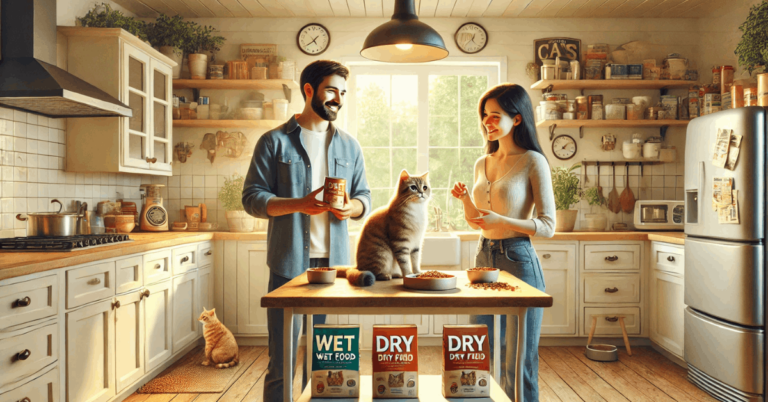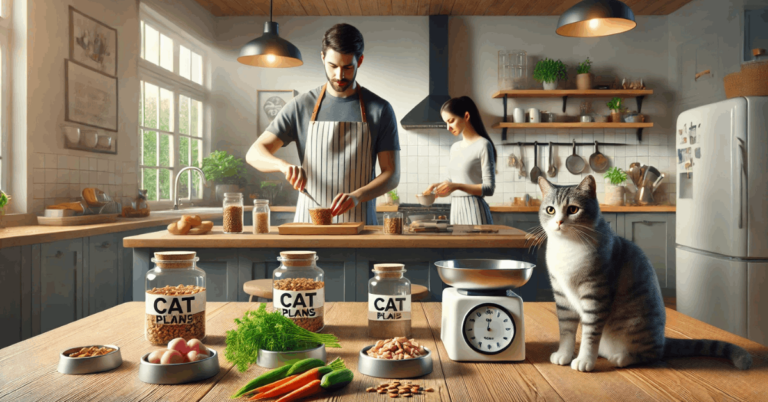A balanced cat diet is key to keeping your feline healthy and active. This article explains the essential nutrients cats need for optimal health.
It helps cat owners make informed choices about their pet’s nutrition. Proper knowledge ensures your cat stays happy, healthy, and well-fed.
The Importance of a Balanced Diet
A balanced diet is the foundation of a healthy life for your cat. It supports growth, energy, and overall well-being.
Cats need the right mix of nutrients to thrive. An improper diet can lead to health problems.
Providing essential nutrients ensures they stay active and strong. A proper diet is one of the best ways to ensure a long and happy life.
Proteins: The Building Blocks
Proteins are essential for muscle growth and repair. They provide energy and support organ function.
Cats are obligate carnivores, meaning they rely on animal-based proteins. Ensuring protein quality is key for their overall health.
Best Protein Sources
Animal-based proteins are the best option. Chicken, turkey, and fish are excellent choices.
Eggs are also a rich and digestible source. Always ensure these proteins are fresh and safe for consumption.
Fats: Essential Fatty Acids
Fats are crucial for energy and nutrient absorption. They promote healthy skin and a shiny coat. Omega-3 and omega-6 fatty acids are particularly important.
Including these fats in the right amounts helps reduce inflammation and supports brain health.
Good Sources of Fats
Fish oil and salmon are rich in omega-3 fatty acids. Poultry fat is a good source of omega-6. Eggs and flaxseed oil also provide healthy fats. Always use these in moderation for balance.
Carbohydrates: Energy Sources
Cats need fewer carbohydrates compared to other animals. They rely mainly on proteins and fats for energy.
Carbs can still provide some benefits when given occasionally. It’s essential to stick to safe and digestible options.
Safe Carbohydrates for Cats
Introduce carbs sparingly into your cat’s diet using the following:
- Cooked rice: A gentle and easily digestible carbohydrate that helps support an upset stomach or diarrhea.
- Pumpkin: A natural source of fiber that promotes regular bowel movements and supports digestive health.
- Sweet potatoes: A nutrient-rich option that provides energy and is suitable for occasional treats.
- Peas: Contain vitamins and fiber, making them a healthy addition to maintain overall wellness.
Vitamins: Vital for Health
Vitamins like A, D, E, and K are essential for overall health and well-being. They play key roles in vision, bone development, and a strong immune system.
A lack of these vitamins can weaken the body and cause serious health problems over time. Too much of them, however, may lead to toxicity and other complications.
Maintaining balanced levels keeps your pet active, healthy, and strong. Regular vet guidance ensures their diet provides the right amounts.
Consequences of Imbalance
A lack of vitamins can lead to poor growth, weak bones, and skin problems. On the other hand, excess vitamins can cause toxicity and harm overall health.
For example, too much vitamin D can negatively impact kidney function. This highlights the importance of maintaining the right balance in their diet.
Ensuring proper vitamin levels supports growth and prevents potential health issues. Regular vet check-ups can help monitor and adjust their nutritional needs.
Minerals: Crucial for Body Functions
Minerals like calcium, phosphorus, and magnesium play key roles in overall health. They support strong bones, nerve function, and muscle activity.
Imbalances can weaken these functions over time. Including minerals in the right amounts ensures optimal health.
Maintaining Mineral Balance
Dairy products, fish, and leafy greens provide important minerals. Calcium and phosphorus must be balanced for bone strength.
Magnesium helps prevent muscle cramps and keeps the body steady. Proper portions of these foods maintain mineral levels.
Water: The Essence of Life
Water is essential for hydration and organ function. It supports digestion, temperature regulation, and toxin removal.
Dehydration can cause serious health issues, including kidney problems. Providing fresh water daily is a must for good health.
Strategies to Encourage Hydration
Encourage hydration using these tips:
- Provide multiple water bowls around the home: Place bowls in different areas to encourage your pet to drink more frequently and stay hydrated.
- Use a cat water fountain for fresh, moving water: The flowing water attracts attention, making it more appealing and increasing their water intake.
- Mix water into wet food for added intake: Adding water to wet food boosts hydration while ensuring your pet still enjoys their regular meal.
- Offer ice cubes for fun and hydration: Ice cubes can serve as a playful and engaging way to encourage drinking while keeping your pet hydrated.
Special Dietary Considerations
Some pets need tailored diets for specific life stages or health issues. These diets help manage growth, aging, or medical conditions.
Diets for Kittens, Seniors, and Health Conditions
Kittens need high protein and fat for growth and energy. Senior pets require lower calories and joint-supporting nutrients.
Those with kidney disease benefit from low-phosphorus, high-moisture food. Pets with diabetes need controlled carbohydrate levels to maintain blood sugar.
Specialized diets help manage these needs effectively. Always consult a vet to select the best diet for specific conditions.
Avoiding Harmful Foods
Certain human foods can be toxic for pets. Knowing what to avoid keeps them safe and healthy.
- Chocolate: Contains theobromine, which can harm the heart and nervous system.
- Onions and Garlic: Damage red blood cells, leading to anemia.
- Grapes and Raisins: Can cause kidney failure, even in small amounts.
- Alcohol: Affects the liver and brain, even in tiny quantities.
- Caffeine: Increases heart rate and causes hyperactivity.
- Xylitol: Found in sugar-free products, it can trigger insulin release and lead to liver damage.
Risks of Table Scraps
Feeding table scraps may seem harmless, but it can cause health problems. Many human foods contain seasonings and fats that upset digestion.
Bones can splinter and injure the stomach or intestines. Over time, this can lead to obesity or nutrient imbalances.
Some foods are outright toxic, as listed above, and even small amounts can cause harm. Relying on proper pet food ensures a balanced diet and avoids undue risks.
Final Insights on Cat Diet Basics
Providing the right cat diet is key to their health and well-being. A balanced diet with essential nutrients like protein, fats, and vitamins supports growth and energy.
Hydration and portion control also play vital roles in maintaining overall wellness. Understanding their needs ensures a healthier and happier life.


